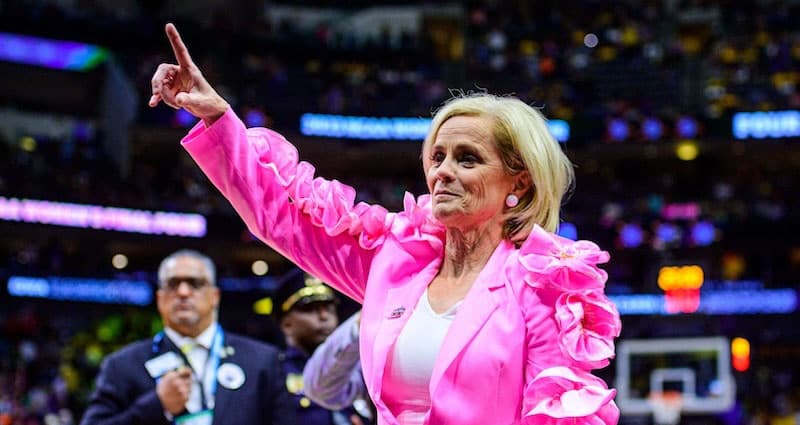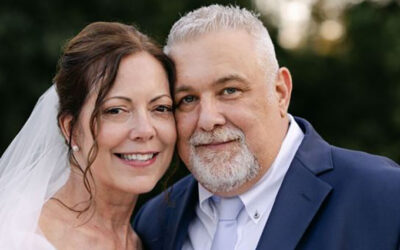In May 2023, Coach Kim Mulkey was riding high after an incredible NCAA championship for the LSU Women’s Basketball team. But a hidden heart condition could have derailed all of those celebrations.
What should have been a routine scan of her neck following a previous surgery showed doctors something alarming — that she had plaque building up in a coronary artery.
Coach Mulkey soon found herself at the office of Carl Luikart, MD, a cardiologist with Our Lady of the Lake Health’s Heart and Vascular Institute, who performed an echocardiogram to determine that she had around 95% blockage.
She was surprised by what Dr. Luikart found, considering she hadn’t noticed any symptoms, felt good and remained active — both courtside and when not coaching. But she did have a family history with heart disease, including her mother.
“I asked Dr. Luikart, ‘Was I going to have a heart attack?’ And he said eventually, yes,” Coach Mulkey recalls.
Of course, by now, most people recognize Coach Mulkey as a driven and energetic leader of LSU’s women’s basketball team. So she wasn’t going to let anything get in the way of their success.
She worked with the Our Lady of the Lake team to schedule a surgical procedure to open up the blockage once she was done with all her celebratory commitments to the team, including a trip to the White House later in May.
Coach Mulkey and Her Heart Care Team
In June, she met with Federico De Puy, MD, an interventional cardiologist at Our Lady of the Lake, who used a minimally invasive procedure to put two stents into the blocked coronary artery. The procedure involves a catheter inserted in the wrist to deliver a mesh tube, or a stent, to the artery to keep it open for better blood flow.
With Dr. De Puy’s skilled work and the assisting care of Dr. Luikart, Coach Mulkey was able to leave the hospital the same day and had an excellent recovery.
“I was thrilled with how well the procedure went,” Dr. De Puy says. “And she tolerated it like a champ. She’s a very hard worker and she’s got the heart of a champion, that’s for sure.”
Dr. De Puy says women tend to show symptoms of heart disease in different ways than men and may overlook the signs because of that. Unfortunately, that’s part of the reason why heart disease is considered a “silent killer” and the leading cause of death in women, according to the Centers for Disease Control & Prevention.
“What I’ve noticed in my female patients is that they will oftentimes have what they describe as chest discomfort — not so much pain, but discomfort — and some shortness of breath,” Dr. De Puy says. That discomfort and fatigue can come about during exercise or other high-energy activities and should be brought up during a visit with their primary care provider.”
Dr. Luikart suggests that women like Coach Mulkey, who are over 50 and have other heart risk factors such as family history, should talk to their primary care provider about screening procedures, such as an electrocardiogram, also known as an EKG, a cholesterol test and a stress test.
He says women should listen to their bodies and also listen to the stories of others like Coach Mulkey, who he says was actively involved in the process of figuring out her health needs.
“Certainly, I can talk for hours about Coach Mulkey as a person,” Dr. Luikart says. “But Coach Mulkey as a patient is a person who wants to know. She asks great questions, and she wants a straight answer.”
Coach Mulkey’s Message to Others
After recovering from her stent placement procedure, Coach Mulkey is back doing what she loves: Coaching LSU’s women’s basketball team and gearing up for a new season.
She’s also thankful for the care she received at Our Lady of the Lake.
“Our Lady of the Lake was just tremendous. I wish that same team could take care of me on every issue I have the remainder of my life,” Coach Mulkey says. “They were very professional, but they were also very personal. They were attentive to what I needed.”
Her heart condition served as a wake-up call to be more mindful about her health. She also hopes it provides others with encouragement to talk to their doctors about their own heart health.
“I just recommend to everybody: You never think it’s going to happen to you, and it does,” Coach Mulkey says. “And I was fortunate. So if me sharing my story makes somebody subconsciously think, ‘You know what? What the heck, let me go get checked out.’ Go do it. Me sharing my story may save somebody’s life.”




